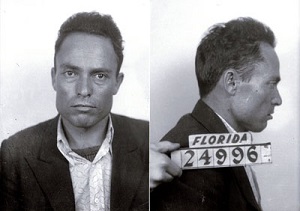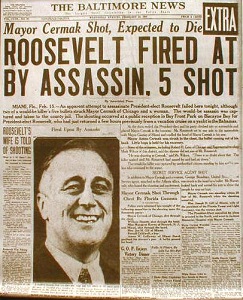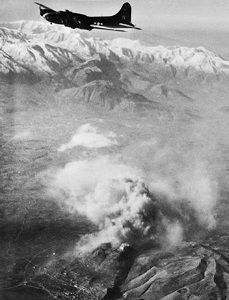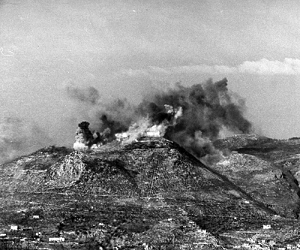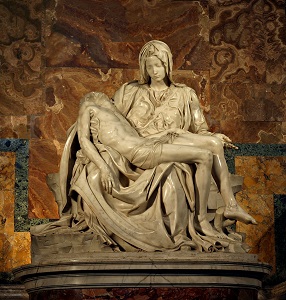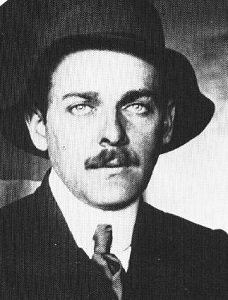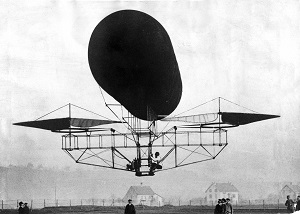The Sunday Section: This Week in History - Feb 15-21
February 15
1882 – A cargo ship from New Zealand, ‘Dunedin’, sails with the first consignment of frozen meat for Britain.
1898 – The US battleship, ‘Maine’, sent to Havana to protect American citizens in Cuba’s rebellion against Spanish rule, has exploded with the loss of 200 lives. The American press is holding Spain responsible and is demanding revenge.
1922 – The Permanent Court of International Justice holds its first session in The Hague.
1933 – Franklin D Roosevelt has escaped an assassination attempt by Giuseppe Zangara, an Italian-born anarchist.
Giuseppe Zangara
1942 – Singapore falls to the invading Japanese force with thousands of British troops captured.
Surrender of Singapore - Lt Gen Arthur Percival, General Officer Commanding, Malaya Command (far right) leading his party to surrender to the Japanese
1944 – The Allies begin the bombing of the German-held strategic position of Monte Cassino in Italy.
B-52 over Monte Cassino Bombing of Monte Cassino monastery
1945 – British forces reach the Rhine in their advance to Berlin.
1952 – King George VI is buried today at Windsor after a state funeral. More than 300,000 had already paid their silent respects as his coffin lay in state at Westminster Hall. He’d never wanted to be king, but his brother’s abdication left him with no choice. He won enormous respect and affection for his dedication during the war, often risking his life visiting troops in the war zones.
1971 – Britain has gone decimal, abandoning the elegant terms of pennies, tanners, bobs, florins and half-crowns for the graceless ‘p’, short for ‘new pence’. Confusingly, new pence are more than twice the value of old pennies.
1974 – Israeli and Syrian forces are locked in battle on the Golan Heights.
1982 – A storm has wrecked an oil rig off the coast of Newfoundland with the loss of 84 lives.
1986 – Violence erupted on the picket line at Wapping when London police in riot gear fought with 5,000 angry union pickets trying to stop distribution of the Sunday Times and News of the World newspapers.
16
1659 – The cheque was used for the first time in Britain when Mr Nicholas Vanacker signed one to a creditor, noting the sum owed. Creditors can present cheques at a goldsmith’s or bank for payment. It is hoped that the use of such notes will help England to catch up with the more sophisticated techniques used in Italy.
1834 – Death of Lionel Lukin, the British inventor of the lifeboat.
1887 – Queen Victoria’s Golden Jubilee was celebrated in India with the freeing of 25,000 prisoners.
1939 – Nylon stockings, on sale for the first time in America, are causing a shopping frenzy.
1945 – US forces capture Bataan in the Philippines.
1959 – Fidel Castro has been sworn in as the leader of Cuba. At 32, he is the youngest-ever leader, and Cuba’s constitution was amended to allow such a young leader to take office.
1960 – The nuclear submarine, USS ‘Triton’, begins her underwater voyage around the world.
1972 – Electricity supplies in Britain are cut due to a miners’ strike.
1977 – The Archbishop of Uganda, the Most Reverend Janani Luwum, has been murdered. Even though Idi Amin, Uganda's dictator, announced that the Archbishop and two cabinet ministers had died in a car crash, there is no doubt that the three were murdered by the notorious State Research Bureau secret police.
Idi Amin and Archbishop Janani Luwum
1983 – Fire devastates South Australia, leaving 8,500 homeless; arson is suspected.
1987 – John Demjanjuk, or ‘Ivan the Terrible’, has gone on trial in Jerusalem accused of the murder of hundreds of Jews at Treblinka, a charge he denies. A former car worker who lived for 40 years in America, he is the second Nazi to be tried in Israel after Adolph Eichmann.
1989 – The police announce that the Pan Am plane crash at Lockerbie is the result of a bomb.
17
1405 – Death of Timur the Lame, aged 68. Known in Europe as Tamerlane, the Mongol conqueror was attempting to conquer China when he died of disease. Crippled in his youth, he did not let the fact that he had to be carried into battle on a litter stop him building his empire by the sword, which stretched from Mongolia to India, and Baghdad to Egypt. Although illiterate, he was a philosopher who impressed the great minds of his time. An art lover, he filled his capital, Samarkand, with looted art treasures.
1880 – Tsar Alexander II escaped an assassination attempt by Russian Nihilists when a bomb exploded in the Winter Palace in St Petersburg.
Tsar Alexander II
1883 – Mr Ashwell of Herne Hill, London, patents the Vacant/Engaged toilet door sign.
1909 – Death of Geronimo, the great Apache warrior chief, aged 80, at his ranch on an Oklahoma reservation, far from the homeland he fought to defend. In 1881, he led the last Apache uprising after US troops killed an Apache holy man. He finally surrendered in 1886.
Geronimo (indiancountrytodaymedianetwork.com)
1958 – A new pressure group is formed in London today to demand that Britain “Ban the Bomb”. The Campaign for Nuclear Disarmament is against American nuclear weapons in Britain.
1972 – With over 15 million cars sold, the German VW Beetle is outselling the US Ford Model-T.
1979 – Chinese forces have invaded Vietnam. Both countries had been allies during the Vietnam War, but since Hanoi’s victory in 1975, Vietnam has turned to the Soviet Union, which has soured relations with China. The situation was further exacerbated when Vietnam invaded Cambodia last month, driving out the murderous Khmer Rouge regime, which China supports.
1982 – General Jaruzelski has imposed martial law in Poland, with thousands being arrested.
1982 – Death of Thelonius Monk, the jazz pianist and composer.
18
1478 – George, Duke of Clarence, is drowned in a butt of wine in the Tower of London.
George, Duke of Clarence
1546 – Death of Martin Luther, the father of reformation, aged 63; he was worn out by overwork. Luther was almost killed by lightning when he was 22, and joined an Augustinian monastery. His dedication to the common man caused conflict with the Roman Catholic Church, and he was excommunicated in 1521. Luther was responsible for reforming the church in German states, abolishing confession and private mass, abandoning monasteries and allowing priests to marry. By translating the Bible into everyday German, he brought it within reach of ordinary people.
1564 – Death of Michaelangelo, aged 89. The artistic paragon of the Renaissance Age, he was still working at the end. He was equally at ease with sculpture, painting, and architecture. Although the ‘Pietá’ and ‘David’ are masterpieces, both carved when he was in his 20s, his greatest work has to be the frescoes of the Book of Genesis that adorn the ceiling of the Sistine Chapel. Commissioned by Pope Julius II, they took four years to complete.
Michaelangelo
'Pieta' 'Sistine Chapel'
1678 – John Bunyan, a 50-year-old lay Baptist, publishes the first part of his ‘Pilgrim’s Progress’. It is already being hailed as a masterpiece of English prose and human insight even though the author has barely any formal education. The story is an allegory of the inner journey from sin to salvation, and also a satire on life. Bunyan knows little of pulpits, for he is a field preacher who has experienced life.
John Bunyan
1855 – Death of Tsar Nicholas I.
1930 – A new planet has been discovered today by an American astronomer, Clyde Tombaugh. The planet is to be named Pluto after the Lord of Hades in Greek myth. The sun’s ninth planet, Pluto is also the smallest.
1967 – Death of Robert Oppenheimer, American physicist and father of the A-bomb.
19
1800 – Napoleon Bonaparte proclaims himself First Consul of the French dictatorship.
1855 – Bread riots break out in Liverpool.
1861 – Tsar Alexander II has signed a proclamation freeing 20 million serfs, about a third of Russia’s population. But to become owners of the land they till, the serfs must pay a redemption tax to the government, and a fee to their former landlords. Few, if any, have the means to do so.
1878 – Thomas Edison is granted a patent for his phonograph.
“Genius is 1% inspiration, 99% perspiration” ~ Thomas Edison
1897 – Death of Charles Blondin, the Frenchman who walked across Niagara Falls on a tightrope.
Charles Blondin (smithsonianmag.com)
1906 – The Battle Creek Toasted Cornflake Company of Michigan has started selling a new kind of ‘instant’ breakfast, consisting of twice-baked wheat flakes. Just add milk and sugar, and they’re ready to eat. The company’s founder, Will K. Kellogg, developed the flakes 30 years ago with his elder brother, Dr John H. Kellogg.
Will K Kellogg
1909 – President Theodore Roosevelt, a keen big-game hunter, is calling for a world conference on conversation.
1914 – Campbell Besley, the British explorer, announces his discovery of lost Inca cities.
1915 – Turkish fortifications along the strategic Dardanelles waterway are, today, facing shelling by a combined Franco-British fleet. The allies are hoping to defeat Turkey and reopen the Black Sea supply route to Russia. The Turkish forts are being bombarded at long range, the big guns being directed by spotter aircraft from the new aircraft carrier HMS Ark Royal.
1921 – A helicopter built by a French engineer, Etienne Oehmichen, has today made a successful test flight in Paris.
Etienne Oehmichen and his experimental helicopter
1942 – The Japanese air force bombs Darwin.
1959 – The independence of Cyprus has been guaranteed by Britain, Greece and Turkey.
1991 – The president of the Russian Federation, Boris Yeltsin, today called on Soviet president Mikhail Gorbachev to resign.
20
1437 – Scotland’s James I has been assassinated. His killers, a group of nobles led by Sir Robert Graham, were seeking to place a rival on the throne, but they have failed as James’ son is to succeed him. He was married to Joan, a cousin of Henry V.
James I
1707 – Death of Aurangzeb, the 6th and last of the great Mogul emperors of India, aged 88. He had seized the throne from his father, Shah Jahan, 49 years ago. To secure the succession, he killed two of his brothers and jailed the third. His stable rule was brought to an end when his third son backed a revolt by the Hindu warriors of Rajasthan, the Rajputs, starting a continuous war between the Moguls and Hindu kingdoms. His empire was brought close to bankruptcy, his subjects taxed to starvation, and he destroyed hundreds of Hindu temples.
Aurangzeb
1915 – San Francisco is staging a world fair in seeming disregard for the Great War that is raging in Europe. Interestingly, several of the warring states are exhibiting at the Panama-Pacific Exhibition, which celebrates the opening of the Panama Canal between the Atlantic and Pacific Oceans.
1938 – Prime Minister Neville Chamberlain’s decision to hold talks with Italy’s Fascist dictator, Benito Mussolini, has resulted in the resignation of Anthony Eden, his foreign secretary.
Anthony Eden
1947 – Lord Louis Mountbatten has been given the task, as India’s last viceroy, of supervising a peaceful transition to independence for India after centuries of British rule. The Labour government has also announced that Britain will leave India by June 1948.
Lord Mountbatten
1962 – Astronaut John Glenn circled the Earth 3 times today, in under 5 hours, to become the first American to orbit the planet. Bad weather and technical problems had caused the flight of the ‘Friendship 7’ to be postponed 10 times. But his flight today went without a hitch.
John Glenn and 'Friendship'
1972 – Death of US journalist Walter Winchell.
1989 – Tern Hill barracks in Shropshire has been destroyed by an IRA bomb.
Bombing of Tern Hill barracks
21
1673 – The outspoken playwright and actor, Moliére, was buried in secret in a Paris cemetery tonight, with no priest to bless his bones. His disdainful wit caused offence, but he was a favourite of King Louis XIV and of the people, who mourned his death. His enemies in the church and at court, however, denied him a proper burial.
1849 – The Punjab is annexed by Britain.
1858 – The first electric burglar alarm is installed by Edwin Holmes of Boston.
1916 – A crucial 8-mile sector of the French line at Verdun in the middle of the Western Front is being battered by German artillery, demolishing the French defences.
Verdun (firedirectioncenter.blogspot)
1957 – Israel defies a UN deadline and holds on to the Gaza Strip.
1960 – All private businesses in Cuba are being nationalised by Castro.
1965 – Death of Malcolm X, the Black Muslim leader. He was shot dead while addressing a meeting in New York.
1969 – The US Patents Office grants a patent to King Hassan of Morocco for his device to monitor the function of the human heart.
1972 – President Richard Nixon is in Peking today, together with national security advisor, Dr Henry Kissinger, who arranged the visit. The trip is intended to explore the possibility of full diplomatic recognition of communist China.
President Nixon being greeted by Premier Zhou En-lai
1989 – Two members of Winnie Mandela’s bodyguard are today charged with the murder of 14-year-old Stompie Moeketsi, a United Democratic Front activist. At just 10-years-old, Moeketsi, whose real name was James Seipei, joined the street uprising against apartheid. He spent his 12th birthday in jail without trail, becoming the country’s youngest political detainee, and was expelled from school when he was 13. He had been kidnapped along with 3 other boys, and accused of being a police informer, which he and the other boys steadfastly denied.
Stompie Moeketsi
1989 – Vaclav Havel, the Czech writer, is jailed for initiating demonstrations.
1991 – Death of Dame Margot Fonteyn, aged 73.
